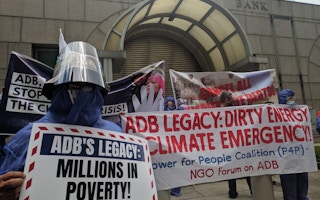The Asian Development Bank (ADB) will cease financing new coal-fired power stations, it announced through its draft energy policy on Friday (7 May).
The multi-lateral lender’s new policy stated that it “will withdraw from financing new coal power and heat plants” and support its developing member-countries “to achieve a planned and rapid phase-out of coal in the Asia and Pacific region.”
According to the draft policy, the bank will not finance coal mining, oil and natural gas field exploration, drilling, or extraction activities.
In ADB’s last energy policy released in 2009, it said it would prioritise energy security and poverty reduction even if it meant tapping coal and natural gas-based power generation.
The revision of ADB’s policy comes 10 months after its management conceded that its energy policy “is no longer adequately aligned with the global consensus on climate change, ongoing global transformation of the energy sector, and operational priorities of ADB’s new Strategy 2030.”
“
While this new policy puts the brakes on coal financing, it still opens doors for fossil gas development.
Jasper Inventor, programme director, Greenpeace Southeast Asia
ADB’s independent evaluation department recommended in August 2020 that it formally withdraw from financing new coal-fired energy projects, a year after the bank’s former president Takehiko Nakao said that it was not yet ready to quit coal. The evaluation was based on an assessment of the bank’s energy policy over the past 10 years.
The evaluation report found that while the Philippines-headquartered bank has refrained from investing in coal-fired power plants, it now needs to align its policy to this practice and clarify its institutional position.
ADB last approved a coal power project eight years ago converting Pakistan’s Jamshoro plant to run on coal instead of heavy fuel oil.
It has also contributed to the funding of the 4,000 megawatt (MW) Tata Mundra coal-fired project in India, the 600MW Visayas Baseload and Masinloc coal project in the Philippines, and the 1,320MW Jamshoro coal project in Pakistan.
The bank declared in 2018 a shift to clean energy, backing US$2 billion worth of investment into renewable energy and energy efficiency, to meet a US$3 billion target for 2020. In March, it also set a target of US$80 billion worth of climate financing by 2030.
The draft new policy states that the lender will help developing nations to “mitigate the health and environmental impact of existing coal-fired power plants and district heating systems through financing of emission control technologies.”
Bank’s support for fossil gas remains
Environmentalists see the new policy as a landmark decision, but are also pushing for the bank to declare that it will abandon funding of other fossil fuels in its final draft.
The draft policy serves as the basis for further consultations with ADB shareholders and the public until June 2021, before the finalised version will be submitted to the board of directors in October.
Glenn Ymata, energy campaigner of NGO Forum on ADB, said the bank is still gridlocked to liquified natural gas and gas finance, as well as harmful waste-to-energy incinerator projects, which all contribute to increasing concentrations of greenhouse gas emissions.
“We are expecting that the ADB will continue involving the civil society in finalising the draft because of the climate, environmental, social, and human rights imperatives,” Ymata said.
Greenpeace added ADB must not provide a loophole and opportunities for businesses to impede the transition to renewable energy by replacing coal with fossil gas.
“ADB’s new policy to stop coal financing is a long-delayed and incremental move. Communities throughout Asia have struggled for decades to demand ADB to stop financing dirty energy. While this new policy puts the brakes on coal financing, it still opens doors for fossil gas development,” said Jasper Inventor, programme director, Greenpeace Southeast Asia.
The bank has spent US$4.7 billion financing gas projects in the region, the majority allocated for gas-fired power plants (44 per cent), exploration and extraction (21 per cent), according to the analysis by the Fossil Free ADB coalition and Oil Change International.
Gas expansion was found by scientists to have played a larger role in increasing global emissions than coal in every year between 2013 and 2019.

















